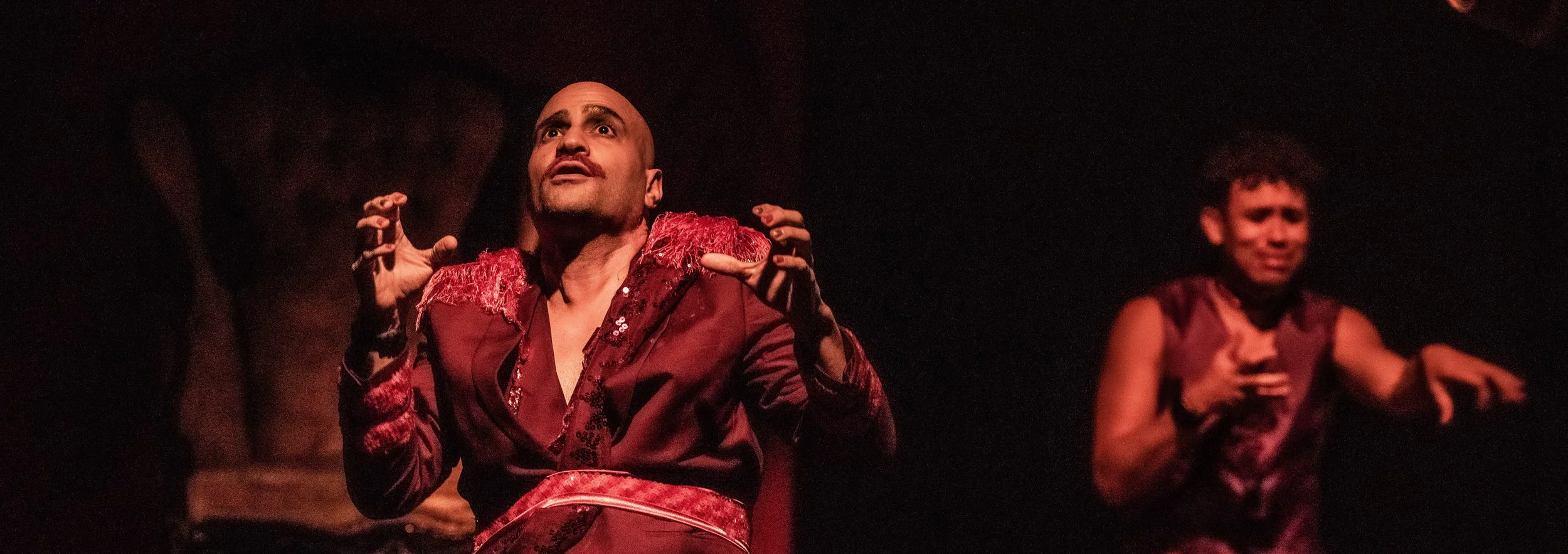If you like political satire with a twist of espionage, look no further than Mark Wilding’s new play, Our Man in Santiago. Directed by Charlie Mount, this comic spy thriller, inspired by the failed U.S. attempt in the 1970s to depose Salvador Allende, Chile’s democratically elected left-wing leader, can reawaken one to the spectacular misfires of American adventurism.
This Beautiful Future
A woman walks over to a large flat-screen TV and, using the remote control, selects a karaoke track. Believe it or not, this is the start of a play set in occupied France in 1944: This Beautiful Future, directed by Jack Serio. That woman and her male counterpart—theater vets Angelina Fiordellisi and Austin Pendleton as characters named Angelina and Austin—are on stage for the entire 80-minute running time, but the story really centers on two teenagers: Otto, a German soldier stationed in Chartres in the summer of ’44, and Elodie, a local girl. They’re both painfully naive. She thinks her Jewish neighbors will eventually come home; he’s psyched to march into England and anticipates a quick British surrender.
Remember This: The Lesson of Jan Karski
David Strathairn, whose stellar career as a character actor has spanned decades, gives a brilliant, riveting solo performance in Remember This: The Lesson of Jan Karski. Playing a Pole who experienced the Holocaust, he draws on historical evidence and the testimony that playwrights Clark Young and Derek Goldman employ in their portrait of a righteous and desperate man determined to prevent the annihilation of his country’s Jews. This is the real-life Karski, humble, modest, and painfully aware of what he could do, and more so of what he could not do, to save them.
Jasper
It is perhaps sign of these pandemic times that several Off-Broadway plays opening in the coming weeks all deal with severe illness. Manhattan Theater Club will stage Martyna Majok’s Cost of Living, featuring a character with cerebral palsy. At the Atlantic, Gracie Gardner’s I’m Revolting is set in a skin-cancer clinic, and next month the Roundabout offers a work by Noah Diaz with the on-the-nose title, You Will Get Sick. But first, the Yonder Window Theatre Company gives us Jasper, a thought-provoking drama in which a boy with a fatal illness tests the limits of his caring parents.
Strings Attached
Early in Carol Buggé’s new comedy-drama, Strings Attached, one of the author’s characters name-checks British writer Michael Frayn’s 1998 play Copenhagen, about an actual 1941 meeting between physicists Niels Bohr and Werner Heisenberg in the Danish capital. Buggé’s reference is a two-edged sword: her own work doesn’t come close to Frayn’s, but it does indicate that she has a passion and knowledge of physics that she wants to share with audiences. Frayn’s treatment is a rare instance of making science dramatically interesting, but Buggé’s overstuffed play is less viable.
My Onliness
Echoing through the halls and into the New Ohio Theatre’s performance space is My Onliness, a daring new experimental work co-produced by the collective One-Eighth Theater, the New Ohio Theatre, and IRT Theater. Written by New Ohio’s artistic director, Robert Lyons, My Onliness takes elements inspired by Polish dramatist Stanislaw Ignacy Witkiewicz and transforms them into what One-Eighth declares as the New Absurd. And wonderfully absurd it is.
Kinky Boots
Following in the footsteps of the 2013 Tony winner for Best Musical, this polished, Off-Broadway revival of Kinky Boots shines under the direction and choreography of Jerry Mitchell, who helmed that Broadway production, and stars Callum Francis, recreating the role of the drag queen, Lola, after having previously donned the titillating titular zip-ups on Broadway as well as in London and Australia.
Hyprov: Improv Under Hypnosis
Near the opening of Hyprov: Improv Under Hypnosis, Colin Mochrie refers to himself as “international comic icon,” but if you haven’t ever seen What’s My Line, Anyway? you might be skeptical of his sweeping claim. (Mochrie’s wry delivery suggests that the description is a bit of a spoof.) Nevertheless, the Canadian native is definitely the funnier half of Hyprov, which combines two disciplines into something unusual and raucously entertaining.
Two Jews, Talking
Old Testament history has been amply recreated on the stage and in film—enslavement in Egypt, the Hebrews’ 40-year desert trek to Mount Sinai, the Ten Commandments, transmission of Jewish laws, and a passionate yearning for the Promised Land. In Two Jews, Talking, playwright Ed. Weinberger loosely and innovatively paints both this saga, a “revisionist” desert adventure, and its cemetery-centered finale, with a very broad brush. He does so with the aid of veteran actors Hal Linden and Bernie Kopell, whose characters face off against each other theologically and temperamentally yet find comfort in each other’s company.
The Near Disaster of Jasper & Casper
It can’t be easy to invent a brand-new fairy tale; even James Lapine and Stephen Sondheim had to rely on the old favorites. But here comes Jason Woods, not only cobbling together an entirely original fantasy with The Near Disaster of Jasper & Casper, but performing all the parts, with distinctive voices and personalities for all the characters. Woods may seize on some familiar plot points, and he’s not always tidy: “Jasper and Casper” don’t rhyme perfectly with “Disaster,” as he seems to have been aiming for. But he knocks himself out to engage the audience.
Macbitches
Sophie McIntosh’s Macbitches is proof positive that some of the most exhilarating theater in New York City is being staged in Off-Off-Broadway houses. McIntosh’s 85-minute piece dramatizes what happens when Hailey (Marie Dinolan), a freshman acting major, is unexpectedly cast in the plum role of Lady Macbeth, and Rachel (Caroline Orlando), the queen bee of a college theater department in Minnesota, is left with big bruises on her ego.
On That Day in Amsterdam
On That Day in Amsterdam begins on a morning in 2015, after two young men have hooked up at a dance club in the Dutch metropolis. One of them, Kevin (Glenn Morizio), an American of Filipino extraction, is impatient to depart: he has a flight back to America later in the day, and he feels no emotional connection. The other, Sammy (Ahmad Maksoud), hopes to know Kevin better and nudges him to have breakfast. A heavy snow delays Kevin’s trip, and what ensues in Clarence Coo’s emotionally reverberating play expands to far more than a gay love story: it is a moving drama about life’s fleeting encounters, loss, nostalgia, home, art, and memory, told in scenes that skip through centuries.
Katsura Sunshine’s Rakugo
Katsura Sunshine’s Rakugo is a fresh and funny solo show in which the director and star, Katsura Sunshine, spins yarns with entrancing charm in the ancient Japanese comic storytelling tradition known as rakugo. It is a pleasure to come across a piece that deals, wittily and delightfully, with a little-known dramatic art form.
The Butcher Boy
Whoa! At the ends of both acts of The Butcher Boy, the Irish Rep’s new musical adapted from Patrick McCabe’s 1992 novel, such unsettling things happen that you’re forced to revisit everything that preceded them, assessing how much was fact, how much was fantasy, and whether or not we should trust our narrating protagonist, Francie Brady (Nicholas Barasch, and we shouldn’t). The Butcher Boy isn’t comforting or reassuring or lovable, and it won’t send you out whistling a happy tune. But, and this puts it ahead of much of the current pack, it isn’t stupid.
The Panic of ’29
The Panic of ’29 isn’t deep. It hasn’t much on its mind, except camp silliness and an encyclopedic knowledge of old-movie tropes, mixed up and scrambled and spilled out on the modest 59e59 stage. Graham Techler’s loose comedy is a Less Than Rent production, which claims in the program that its mission is “examining the relationship we have to capital and the web of injustices that stem from an allegiance to profits over people.” We don’t get a whole lot of that, except in the broadest terms, but we do get some zingy one-liners and a lively troupe of players. The first half-hour or so of The Panic of ’29 is rather delightful. And then it just goes no-damn-where.
Under the Dragon’s Tail
On the lam criminals, a would-be king living as an exiled stoner, an untethered cosmonaut, and a pair of lovers sorting through the detritus of a terminated relationship—are the characters populating Isaac Byrne’s Under the Dragon’s Tail. Byrne also directs the quartet of one-acts that are not always in perfect harmony, but as a quadriptych, they intriguingly show the ways in which elements of mythology, metaphor, and symbolism can give order to the chaos of the contemporary world.
Cat on a Hot Tin Roof
Tennessee Williams’s Cat on a Hot Tin Roof features roles that are (pardon the expression) catnip to adventurous actors. This land mine of a play premiered in 1955, a year that, in retrospect, seems the apex of Williams’s success. The playwright’s career took off with The Glass Menagerie in 1945, followed by A Streetcar Named Desire in 1949, and continued for 28 years after Cat, until his death in 1983. During a long literary decline, he wrote a number of lesser, though admirable, plays, but even the best of those don’t measure up to his depiction of the Pollitts, a clan of nouveau riche Southern strivers squabbling over “twenty-eight thousand acres of the richest land this side of the valley Nile.”
Sex, Grift and Death
Potomac Theatre Project’s Sex, Grift and Death, an evening of one-acts by British playwrights Steven Berkoff and Caryl Churchill, captures the brutal nature of sex, financial survival, death, and illness. The lively cast uses a mixture of British and American accents that work for the sensibility of each piece.
Mister Miss America
Neil D’Astolfo’s Mister Miss America provides many pleasures beyond its nifty title, even though the material treads some pretty familiar ground. In the solo show, the beauty pageant obsessions of gay hero Derek Tyler Taylor (D’Astolfo) take center stage. DTT wants to share the story of his attempt to break the gender barrier at a beauty pageant in southwestern Virginia, where the contestants mostly hail from obscure burgs, such as Bristol, Galax, Martinsville and Radford, and the announcer uses descriptions like “She’s hotter than your pappy’s pistol!” as an introduction.
Reverse Transcription
For theater aficionados, the summer visits of Potomac Theatre Project to the Atlantic Theater are bracing—weighty pieces rather than fluffy fare. British writers, often well-represented, comprise one evening this year, but two American plays comprise the second. A revival of Dog Plays, a 1989 one-act with snapshot scenes that focus on the AIDS crisis, is by Robert Chesley, who wrote it after receiving “the diagnosis.” (He died in 1990.) It has been dusted off and paired with a new play, A Variant Strain, by writer-director Jim Petosa and Jonathan Adler, that is indebted to the older work.


























